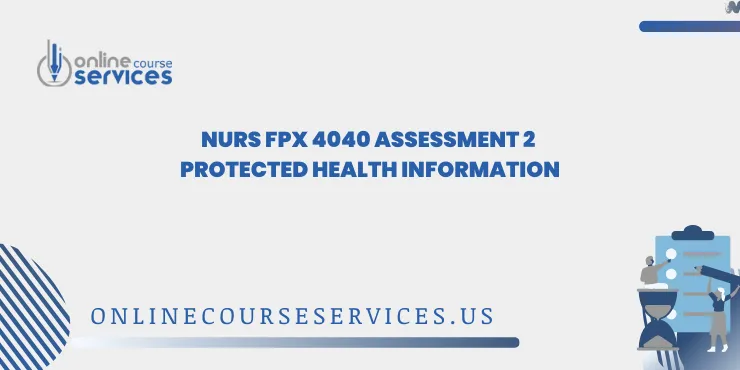- NURS FPX 4040 Assessment 2 Protected Health Information (PHI): Privacy, Security, and Confidentiality Best Practices.
Staff Health Interprofessional Update
Social media can be unimaginably powerful for communicating healthcare information to the general population, creating professional associations, and sharing encounters. On a professional level, it has many significant advantages in exchanging ideas and discussing health issues. Confidentiality, privacy, and security are three fundamental ideas in any healthcare setting regarding safeguarding health information (PHI) and the Health Insurance Portability and Accountability Act (HIPAA).
With the new developments and updates in this hospital, information on one of our valued representatives was unfortunately terminated because of a breach of the patient’s privacy. Although this was a hard choice, it has had a significant impact and broad results. Coming up next is a fast update, assisting all staff with recalling our strategies to prevent this from happening starting now and into the foreseeable future.
- HIPAA and Patient Privacy
HIPAA – The Health Insurance Portability and Accountability Act safeguards ALL individuals’ health information from being revealed without the patient’s assent.
PHI – Safeguarded health information under U.S. law is any information about health status, arrangement of health care, or payment for health care created or gathered by a Covered Substance. It can be associated with a particular individual (TechTarget, 2021).
Examples – Patient names, addresses, and anything more unambiguous than the state, including road address, city, area, locale, and postal district. Date of birth, discharge, admittance, and death dates. Telephone and fax numbers. Email addresses.
Unprofessional Behavior – Posting photographs of patients on any social media platform is Disallowed. Refrain from giving out information, fortunate or unfortunate, or remarks about patients. Please make a work note not to give details that could reveal a patient’s attendance in the facility. Recall that web-based posts, tweets, and web journals are not private communications and can be utilized against you in an investigation by your board of nursing.
- Social Media and HIPAA Violations
Whether intentional or inadvertent, social media posts that breach patient privacy and confidentiality are the most unbelievably awful. They incorporate patient photographs, negative remarks about patients, details that could recall them, the healthcare setting, or unequivocal departments.
Regardless, when posted with the best expectations, for example, attempting to get professional advice from colleagues about patient care, these posts are discoverable and can lead to legal issues, with potential fines and jail time for Health Insurance Portability and Accountability Act (HIPAA) violations, termination or other discipline from your manager, action taken against your permit by a BON, routine litigation, or professional liability claims, as highlighted in NURS FPX 4040 Assessment 2 Protected Health Information (PHI): Privacy, Security, and Confidentiality Best Practices (Balestra, 2018).
WE HAVE A RESPONSIBILITY!!!
Lack of privacy can sabotage patients’ relationships with suppliers and may adversely affect the quality of care, assuming patients are reluctant to share personal health information. Notwithstanding the presence of laws and organizational strategies expected to give assurance, patients may also be pressured that the transparency of their health information, including hereditary tests, may achieve the mishap or denial of health insurance, work discrimination or cause personal embarrassment.
What Happens When a Nurse Breaches Patient Confidentiality?
Cases are usually reviewed individually; results can range from formal layouts to being given up. The reality of the reprimand usually relies on the breach, the factors that led to it, and the nurse’s aim. Nurses who make accidental breaches should attend additional training.
Most importantly, a violation of patient confidentiality is a serious issue in any healthcare setting. As a nurse, you are obligated to take care of the patient, and maintaining their privacy is essential. You can’t afford to disregard a breach. Whether you caused it or not, reporting it is usually the best strategy.
How Does One Report A Breach?
Immediately contact your manager or compliance official to determine what actions should be taken to mitigate hazards and decrease the potential for harm. The episode should be investigated, a gambling assessment performed, and a breach report conveyed to the Department of Health and Human Administration’s Office for Social Equality. You ought to explain that a mistake was made and what has happened. You should also explain which patient’s records were viewed or revealed. Failure to report such a breach immediately can transform a basic bobble into a significant occasion that could result in disciplinary action and potentially penalties for your boss.
Confidentiality is everyone’s responsibility. We ALL want to see our patients win, recuperate, and return. However, we have to be more cautious. We should cooperate to give our patients the best healthcare experience by safeguarding their health and privacy while in our care, as emphasized in NURS FPX 4040 Assessment 2 Protected Health Information (PHI) Privacy, Security, and Confidentiality Best Practices. Thank you for your time.
References
ANA Center for Ethics and Human Rights. (2015). American Nurses Association position statement on privacy and confidentiality Balestra, Melanie L, N.P., E.S.Q. (2018). Social media missteps could put your nursing license at risk. Alabama Nurse, 45(3), 18.
How should you respond to an accidental HIPAA violation? HIPAA Journal. (2021, January 21). https://www.hipaajournal.com/accidental-hipaa-violation/.
Lutkevich, B., Wallask, S., & DelVecchio, A. (2021, April 5). What is phi (protected/personal health information)? SearchHealthIT. Retrieved December 13, 2021, from https://searchhealthit.techtarget.com/definition/personal-health-information.
Onward Healthcare. (n.d.). (2021). https://www.onwardhealthcare.com/nursing-resources/how-to-address-breaches-in-patien t-confidentiality/.

